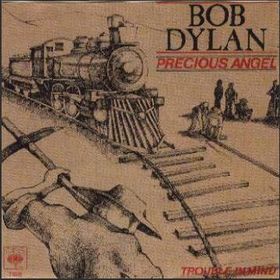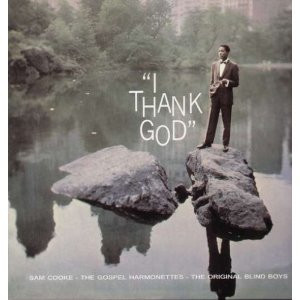
Blind Willie McTell was an American Piedmont blues and ragtime singer and guitarist. He played with a fluid, syncopated fingerstyle guitar technique, common among many exponents of Piedmont blues. Unlike his contemporaries, he came to use twelve-string guitars exclusively. McTell was also an adept slide guitarist, unusual among ragtime bluesmen. His vocal style, a smooth and often laid-back tenor, differed greatly from the harsher voices of many Delta bluesmen such as Charley Patton. McTell performed in various musical styles, including blues, ragtime, religious music, and hokum.

Infidels is the twenty-second studio album by American singer-songwriter Bob Dylan, released on October 27, 1983, by Columbia Records.

Blind Willie Johnson was an American gospel blues singer and guitarist. His landmark recordings completed between 1927 and 1930—thirty songs in total—display a combination of powerful "chest voice" singing, slide guitar skills, and originality that has influenced generations of musicians. Even though Johnson's records sold well, as a street performer and preacher, he had little wealth in his lifetime. His life was poorly documented, but over time, music historians such as Samuel Charters have uncovered more about Johnson and his five recording sessions.
Richard "Rabbit" Brown was an American blues guitarist and composer. His music has been characterized as a mixture of blues, pop songs, and original topical ballads. He recorded six sides for Victor Records on March 11, 1927, one of which, "James Alley", is included in the 1952 Anthology of American Folk Music and has been covered by Bob Dylan, among others.

The Blind Boys of Alabama, also billed as The Five Blind Boys of Alabama, and Clarence Fountain and the Blind Boys of Alabama, is an American gospel group. The group was founded in 1939 in Talladega, Alabama, and has featured a changing roster of musicians over its history, the majority of whom are or were vision impaired.

Robert Hicks, known by the stage name Barbecue Bob, was an early American Piedmont blues musician. His nickname was derived from his working as a cook in a barbecue restaurant. One of the three extant photographs of him show him playing a guitar and wearing a full-length white apron and cook's hat.

"In My Time of Dying" is a gospel music song by Blind Willie Johnson. The title line, closing each stanza of the song, refers to a deathbed and was inspired by a passage in the Bible from Psalms 41:3 "The Lord will strengthen him upon the bed of languishing, thou wilt make all his bed in his sickness". Numerous artists have recorded variations, including Bob Dylan and Led Zeppelin.

"John the Revelator" is a gospel blues call and response song. Music critic Thomas Ward describes it as "one of the most powerful songs in all of pre-war acoustic music ... [which] has been hugely influential to blues performers". American gospel-blues musician Blind Willie Johnson recorded "John the Revelator" in 1930. Subsequently, a variety of artists, including the Golden Gate Quartet, Son House, Depeche Mode, Jerry Garcia Band, The White Stripes, The Forest Rangers, The Sword, have recorded their renditions of the song, often with variations in the verses and music.

"It's Nobody's Fault but Mine" or "Nobody's Fault but Mine" is a song first recorded by gospel blues artist Blind Willie Johnson in 1927. It is a solo performance with Johnson singing and playing slide guitar. The song has been interpreted and recorded by numerous musicians in a variety of styles, including Led Zeppelin on their 1976 album Presence.

"Precious Angel" is a song written by Bob Dylan that first appeared on his 1979 album Slow Train Coming. It was also released as a single in the Netherlands. "Precious Angel'" is a religious love song, released during his "born-again Christian" period. Music critic Michael Gray considers it one of the standout tracks on Slow Train Coming.

The Soul of a Man is an album of "twenty haunting spiritual blues songs" recorded in the late 1920s and 1930 by the American gospel blues singer and guitarist Blind Willie Johnson that was released by Charly Records in 2003.
"Jesus Met the Woman at the Well" is a traditional gospel song. It relates the story of the meeting between Jesus and the Samaritan Woman, found in the Gospel of John at 4:4-26.
"Keep Your Lamp(s) Trimmed and Burning" is a traditional gospel blues song. It alludes to the Parable of the Wise and Foolish Virgins, found in the Gospel of Matthew at 25:1-13, and also to a verse in the Gospel of Luke, at 12:35.

"Bye and Bye We're (or, I'm) Going to See the King" is a Christian song from the African-American musical tradition. It is known by a variety of titles, including "I Wouldn't Mind Dying (If Dying Was All)" and "A Mother's Last Word to Her Daughter". It was recorded seven times before 1930, using the preceding titles.

"If It Had Not Been For Jesus" is an American Christian hymn of unknown authorship. It was included in four hymnals published between 1905 and 1938. The title is taken from the first line of the refrain. An alternative title is the first line of the first verse, namely "I Was a Deep Dyed Sinner". The song is unusual in that it is in triple metre, with three beats to the bar. That suggests that the song may have been composed by an individual whose name has been lost, rather than being ascribable only to "traditional".

The Complete Blind Willie Johnson is a compilation album of all the known recordings by American gospel blues singer-guitarist Blind Willie Johnson. As part of the Roots N' Blues series, it was released jointly by Columbia Records and Legacy Recordings, on April 27, 1993. All of the tracks on the two-compact disc set were originally issued by Columbia on the then-standard two-sided 78 rpm record format.

American Epic: The Best of Blind Willie Johnson is a compilation album released to accompany the award-winning American Epic documentary film series. It collects performances from Blind Willie Johnson's five recording sessions for Columbia Records in Dallas, Atlanta, and New Orleans between 1927 and 1930. The album was released as a 16-track download and a vinyl LP.

I Thank God is a 1960 compilation album of gospel songs by Sam Cooke along with The Gospel Harmonettes and The Original Blind Boys, released on Keen Records.














